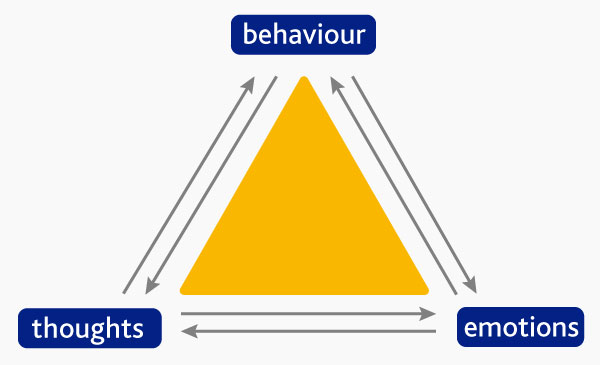Psychotherapeutische Hochschulambulanz
Fürst-Johann-Moritz-Straße 8-10 57072 Siegen
Tel.: +49 (0)271/740-5550
Die telefonischen Sprechzeiten finden Sie hier.
Außerhalb der telefonischen Sprechstundenzeiten ist eine Terminvereinbarung nur über das Kontaktformular möglich.
Therapy methods

Basically there are four psychotherapy methods, which are are recognized by health insurance companies:
- Analytical Psychotherapy
- Psychotherapy based on depth psychology
- Behavior Therapy
- Systemic therapy
All four methods have been proven to be effective in
scientific studies.
At present, the Psychotherapeutic Ambulance of the
University of Siegen exclusively offers behavior
therapy.
It is planned to also offer analytical psychotherapy and
psychotherapy based on depth psychology in the future.
Behavior Therapy
What is that?
Behavioral therapy assumes that our feelings and thoughts and our behavior are shaped by experiences that we make in the course of life. Characteristics, behavior patterns and abilities are therefore learned and can be changed through new learning experiences.
In behavioral therapy, a close connection between behavioral and thought patterns, attitudes and feelings is assumed, which can be seen, for example, in how you deal with current stressful situations, how you shape your relationships and how you deal with conflicts.
Together with your therapist, you try to identify and favorably change current stressful and problem-relevant thoughts, feelings, attitudes and behaviors. Behavioral therapists use a variety of techniques and methods for this purpose, which have been proven to be effective by scientific empirical research. These are developed and applied transparently with the patients.
The goal is to learn to better deal with psychological stress, to try out new ways of thinking and behavior and to discard old patterns. Behavioral therapy is thus oriented both to current problems and to the biographical factors that are relevant to the development and maintenance of the symptoms.
What does behavior therapy involve in concrete terms?
In behavioral therapy, you are first asked in particular what you are currently suffering from, what is currently burdening you and what is affecting your life. Your therapist will look for explanations for these disorders together with you. For example, he/she will talk to you about why it is difficult for you to meet more people, what bad experiences you have had in doing so, but also how these experiences shape your expectations in current situations.
The psychotherapist will look at your thought patterns with you and consider together with you how you can change them. This is about questioning your assumptions about what might happen and exploring new ways. Behavioral therapy requires your active cooperation. This can mean, for example, that you try out new behavioral patterns between therapy sessions and independently practice the skills you have learned. The psychotherapist will help you to better understand how you shape your relationships and how you can change your behavior so that you get along better and suffer less.
As a rule, one hour of treatment of 50 minutes per week takes place. In most behavioral therapy sessions, you will sit opposite the psychotherapist. Sometimes, however, the therapy includes several hours in a week, for example when you leave the practice with the therapist to face a situation that frightens you. In most cases, the treatment lasts half a year to a year, but sometimes it lasts longer. Behavioral therapy is available as short-term therapy (24 units of 50 minutes each) or as long-term therapy (60 units of 50 minutes each). If during the therapy it is jointly determined that an extension seems to be useful, it can be applied for at the health insurance company (up to a maximum duration of 80 units of 50 minutes each).
Analytic Psychotherapy
The Analytic Psychotherapy goes back to psychoanalysis, which was founded towards the end of the 19th century and has been developed further since then. According to psychoanalytic theory, mental illness is caused by inner conflicts that people have experienced in their lives and relationships, especially in the first years of life. The human psyche ensures that painful experiences and particularly stressful experiences are often excluded, i.e. repressed, from conscious perception. However, the conflicts repressed in this way continue to influence (mostly unconsciously) how we think, feel and act. Early relationships with parents and siblings, for example, shape our later relationships as adults. They can also lead to mental illness if the patterns we learned as a child prove to be disturbing or useless in later life. According to psychoanalytic theory, mentally ill people repeat relationship patterns that were originally a solution but prove to be no longer helpful for current relationships.
In a psychoanalytic conversation, the psychotherapist helps you to become aware of the relationship patterns and the associated repressed feelings, memories and inner conflicts. To do this, you describe to him or her the thoughts or memories that are going through your mind without evaluating or judging what is said. In doing so, he assumes that these associations are not accidental, but say something about what moves you internally and shapes your behavior. The goal is to find new ways out of the recurring emotional dead ends through a deeper understanding of yourself.
During an Analytical Psychotherapy session you usually lie on a couch and have only limited eye contact with the psychotherapist. Analytical Psychotherapy is usually a long-term therapy and often lasts two years or longer. You will usually arrange for 2 to 3 treatment hours per week.
Psychotherapy based on depth psychology
Psychotherapy based on depth psychology (as well as analytical psychotherapy) has its origins in psychoanalysis. It is assumed that psychological complaints are expressions of (unconscious) "inner conflicts" which developed in the early biography and could not be solved. Psychotherapy based on depth psychology assumes that repressed experiences have a strong influence on later (and current) life. The goal of therapy is to identify and resolve the unconscious conflicts that lead to current psychological problems.
In depth psychologically based psychotherapy, you sit facing your psychotherapist with eye contact. The psychotherapist usually agrees with you on 1 to 2 hours of treatment per week. The treatment is often shorter than in analytical psychotherapy and can last between 6 months and 2 years. Psychotherapy based on depth psychology is available as short-term therapy (24 units of 50 minutes each) or as long-term therapy (60 units of 50 minutes each). If during the therapy it is jointly determined that an extension seems to be useful, an extension can be applied for (up to a maximum duration of 100 units of 50 minutes each).


